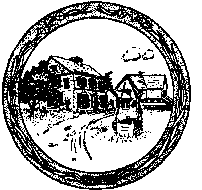



|
 NCE upon a time there was a farm-house, and it was painted
white and had green blinds; and it
stood not far from the road. In the fence was a wide
gate to let the wagons through to the
barn. And the wagons, going through, had made a track
that led up past the kitchen door
and past the shed and past the barn and past the
orchard to the
NCE upon a time there was a farm-house, and it was painted
white and had green blinds; and it
stood not far from the road. In the fence was a wide
gate to let the wagons through to the
barn. And the wagons, going through, had made a track
that led up past the kitchen door
and past the shed and past the barn and past the
orchard to the
Behind the barn was the hen-house, and inside the
Along the side of the hen-house were some boxes with hay in them, and a board along the top. These were the nests, and in each nest was a pretend egg, made of china. The hens would see the pretend egg and think it was real, and they would lay the real eggs in the nests. For they like to lay eggs in places where eggs are already.
There was a little door, low down, for the hens to go
through, and outside was a yard, with a
fence around made of strips
of wood. In this fence was a door that was kept shut in
winter, but was open in summer so
that the hens and chickens could go out and eat the
bugs and worms. Bugs and worms
sometimes eat the growing things that the farmers have
planted, so the farmers like to
have the chickens eat the bugs and worms. And in the
side of the
When the summer was beginning, there were a good many hens and some chickens that were half grown up, and a very old rooster, and some that were not so old. Sometimes the roosters would fight, but they didn't fight very hard, for they were not the kind that fight hard.
All the roosters and the hens and the chickens that
were half grown up flew up
into the trees when it was beginning to be dark, and
they sat on the branches in long rows,
and put their heads under their wings and went to
sleep. The very old rooster and most of
the hens roosted in the
And in the middle of the night the old rooster waked a little and crowed, but it wasn't a very loud crow. But when it began to be light in the morning, the old rooster waked and flapped his wings and crowed very loud. And that waked the other roosters and they flapped their wings and crowed, and the hens waked, and all the roosters and the hens flapped their wings and flew down to the ground, and began to look about for their breakfast.
![[Illustration]](http://www.gatewaytotheclassics.com/gold/books/hopkins/farm/hopkins_farm_zpage178.gif)
Some of the hens stayed in the orchard and looked about
on the ground and scratched up the
dirt and picked up the bugs and worms that they found.
Some of them went over to the
After awhile, when all the hens and chickens had
finished their breakfasts, some of the hens
went into the
![[Illustration]](http://www.gatewaytotheclassics.com/gold/books/hopkins/farm/hopkins_farm_zpage180.gif)
One of these hens walked along the little road and
across the
The other hen that wouldn't lay eggs in the hen-house
made a nest in the
![[Illustration]](http://www.gatewaytotheclassics.com/gold/books/hopkins/farm/hopkins_farm_zpage181.gif)
When the hens had laid their eggs, they went out into
the road and sat down in the dust and
scratched the dust up all over themselves, for they
liked the warm dust in among their feathers.
And they stayed there until they were hungry again.
Then they scratched around in the dirt, and
ate some more bugs and worms, and the things that
Then they all walked along to the orchard or to some other trees, and they stood under the trees, and looked up and gave queer little jumps and flapped their wings, and they flew up into the trees and sat on the branches. And they went along the branches sideways until they had found the places they liked. Then they squatted down and put their heads under their wings and went to sleep.
And that's all.